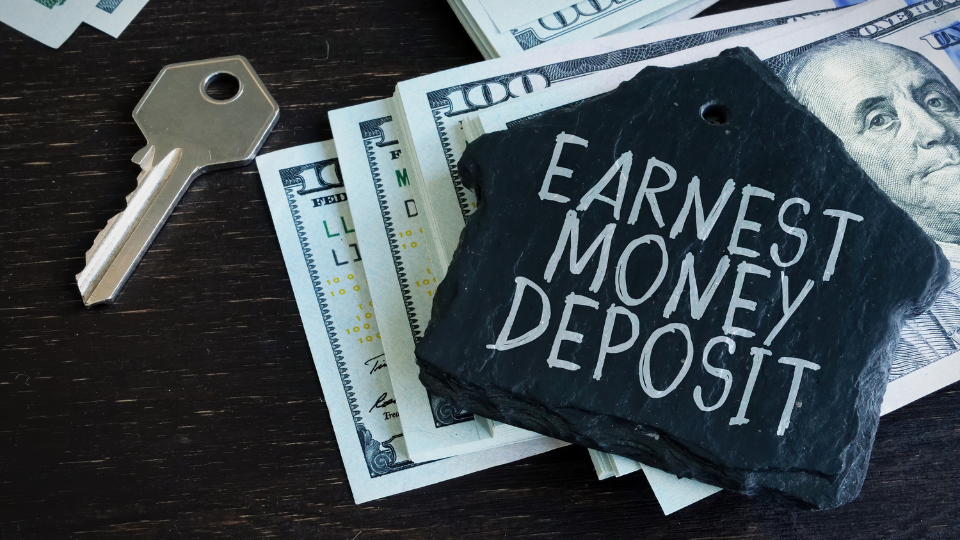Entering the realm of real estate can be simultaneously exciting and daunting. For many, buying a home represents a significant life milestone, complete with hopes, dreams, and sometimes a fair share of anxieties. One of the most critical yet often misunderstood components of a home purchase is the earnest money deposit—a sum of money offered by the buyer to demonstrate sincere intent to purchase the property. Often simply referred to as “earnest money,” this deposit serves as a good faith gesture, indicating that the buyer is serious about completing the transaction.
When you make an offer on a property, your earnest money sends a clear message: you are not merely testing the market or casually inquiring; you are prepared to move forward under the terms of your contract. From a seller’s perspective, an earnest deposit can be a comforting sign that the buyer is likely to see the process through. From a buyer’s perspective, it can be a powerful tool to strengthen an offer—yet it also entails certain risks if not handled properly.
Understanding the function and management of earnest money is crucial for everyone involved in the transaction. Buyers who learn how earnest money is held, when it is refundable, and what contingencies can protect it stand to minimize financial surprises. Sellers, in turn, benefit from recognizing how earnest money serves as a safety net against buyers who might withdraw their offers without valid reason.
In this post, we’ll delve into the intricacies of earnest money, discussing its definition, purpose, and importance from both the buyer’s and seller’s perspectives. We’ll walk you through the typical timelines associated with earnest money deposits and examine the escrow process—an essential mechanism that helps protect both parties. We’ll also discuss contingencies, which can be a powerful shield for buyers looking to safeguard their deposit. Finally, we’ll explore what happens when a real estate transaction does not go as planned, including how and why earnest money can be refunded or forfeited. By the end of this comprehensive guide, you’ll have the knowledge you need to navigate earnest deposits with confidence and clarity, ensuring you can move forward in your real estate journey with peace of mind.
The Role of Earnest Money in Home Buying
Earnest money plays a pivotal role in home buying, essentially signaling the buyer’s intention to purchase the property. When a buyer makes an offer on a home, they include an earnest deposit along with the purchase agreement, showing the seller that they are not just a window shopper but a serious contender. Sellers typically prefer offers that include a substantial earnest deposit because it indicates that the buyer is less likely to walk away from the deal without a legitimate reason.
Demonstrating Serious Intent
One of the primary reasons for earnest money’s existence is to separate serious buyers from those who are less committed. Without earnest money, a prospective buyer could make multiple offers on different properties, tying them up under contract, and then walk away when they decide which one they prefer—leaving sellers in a difficult position. The earnest deposit, therefore, reassures the seller that the buyer intends to move forward in good faith, pending any standard contract contingencies or issues discovered during the due diligence period.
How Much Is Enough?
The amount of earnest money required can vary widely depending on factors such as local customs, market conditions, the property’s price range, and the negotiation between the buyer and seller. In a moderately competitive real estate market, an earnest money deposit might range between 1% and 3% of the purchase price. However, in more competitive markets—especially when sellers receive multiple offers—buyers might offer higher earnest deposits to stand out from the crowd and strengthen their position.
It’s important to note that the amount of earnest money is often negotiable. A larger deposit can appeal to a seller and might tip the scales in your favor if the seller is evaluating similar offers. However, offering too large a deposit without proper contingencies may put the buyer’s finances at higher risk should the deal fall through. Striking the right balance is key.
The Process of Depositing Earnest Money
Once an offer is accepted, the earnest money is usually deposited into an escrow account—a neutral, third-party account that holds funds during the transaction. The timeline for depositing earnest money can differ from state to state and contract to contract, but it generally occurs within a few days of the seller’s acceptance. Buyers must be prompt in submitting the earnest deposit to avoid breaching the terms of the contract.
If the deal proceeds to closing successfully, the earnest money is typically applied toward the buyer’s closing costs or down payment. In other words, it is not an additional fee but part of the overall funds used to purchase the home. This ensures that earnest money remains integrated into the financial structure of the purchase rather than serving as a separate, “lost” cost.
Significance to Both Parties
For buyers, earnest money can be viewed as a means to boost their credibility. It assures the seller that the buyer is willing to follow through, which can be particularly important in competitive markets. For sellers, having an earnest deposit in place adds a layer of protection. If the buyer decides to walk away without a valid reason protected by contingencies, the seller may be entitled to keep the deposit as compensation for lost time and potential missed opportunities to sell the property to another party.
Ultimately, earnest money is a cornerstone of trust in real estate transactions, setting the foundation for a smoother and more transparent process. When both parties understand how it works and the protections in place, the likelihood of conflicts or misunderstandings decreases significantly.
Timelines and Escrow: Navigating the Process
The timeline associated with an earnest deposit often spans from the moment the offer is accepted until the closing date. Understanding these milestones helps buyers and sellers alike manage expectations and responsibilities.
The Typical Timeline
- Offer and Acceptance: As soon as both parties sign the purchase agreement, the clock starts ticking for the earnest deposit. Many contracts require that the buyer submit their earnest money within one to three business days of the seller’s acceptance.
- Escrow Deposit: The earnest money is then placed in an escrow account. This account is managed by a neutral third party—often a title company, an escrow company, or even a real estate brokerage. The purpose of escrow is to hold funds and documents securely until all conditions of the transaction are met.
- Contingency Periods: During the weeks leading up to closing, various contingencies such as inspection, appraisal, and financing come into play. If any issues arise, this period allows the buyer to back out or renegotiate without automatically forfeiting the earnest deposit, assuming the problem falls under a recognized contingency in the contract.
- Closing: At the closing table (or prior to closing day, depending on local practices), the earnest money is applied toward the buyer’s closing costs or down payment. If the transaction goes smoothly, the earnest deposit simply becomes part of the overall funds to finalize the purchase.
Adhering to this timeline is crucial. Missing a deadline or failing to deposit the earnest money on time can constitute a breach of contract, potentially giving the seller the option to cancel the agreement.
The Role of Escrow
Escrow accounts are designed to protect both buyers and sellers, as well as any other parties involved in the transaction (such as lenders). The escrow agent is a neutral stakeholder whose job is to follow the instructions laid out in the purchase agreement and ensure that all contractual obligations are fulfilled before disbursing funds.
Key Responsibilities of the Escrow Agent
- Holding Funds and Documents: The escrow agent securely holds the earnest money deposit, as well as any important documents such as the deed, loan documents, and title reports.
- Facilitating Communication: The agent acts as a central hub of communication, ensuring that the buyer, seller, and lenders have the necessary information to meet deadlines and comply with the terms of the contract.
- Handling Legal and Regulatory Requirements: Depending on the location, the escrow agent may also be responsible for making sure all state and local regulations are followed. This includes verifying that property taxes, homeowner’s association dues, and any liens are properly settled.
- Preparing Closing Statements: When the transaction is ready to close, the escrow agent prepares the settlement statements (sometimes called closing statements), detailing all of the charges and credits for both buyer and seller.
Through the escrow process, both parties can transact with confidence. The buyer knows their deposit is in safe hands and will be credited to them at closing, while the seller is assured that the earnest money is available should the buyer default without a valid contingency.
Protecting Your Deposit: The Power of Contingencies
For buyers, the earnest money deposit can represent a significant portion of their available cash, so it’s understandable to want assurances that this money isn’t at undue risk. That’s where contingencies come into play. A contingency is a condition included in the purchase contract that must be met before the deal can move forward. If the condition isn’t satisfied, the buyer can often terminate the contract and receive a refund of their earnest money.
What Are Contingencies?
Contingencies are protective measures that give the buyer (and sometimes the seller) a way to walk away from the contract under certain circumstances without penalty. They spell out specific conditions under which the buyer can back out, ensuring that the deposit doesn’t automatically go to the seller. Essentially, contingencies act as escape hatches tied to particular events or findings, such as unsatisfactory inspection results or difficulty obtaining financing.
Common Contingencies That Impact Earnest Money
- Inspection Contingency: One of the most common contingencies allows the buyer to conduct a professional home inspection. If the inspection uncovers problems—structural damage, roofing issues, electrical hazards, or other deficiencies—the buyer can negotiate repairs or a price reduction with the seller. If the seller refuses to address the problems and no agreement can be reached, the buyer may withdraw from the contract and retain their earnest deposit.
- Appraisal Contingency: Most lenders require an appraisal to ensure that the property’s value justifies the loan amount. If the appraisal comes in lower than the agreed-upon purchase price, buyers have a few options: they can negotiate a lower price with the seller, increase their down payment to make up the difference, or walk away from the deal (assuming the appraisal contingency is in place). If they walk away, the earnest money is typically refunded.
- Financing Contingency: Also known as a mortgage contingency, this protects the buyer if they fail to secure financing for the home. If the lender ultimately denies the buyer’s loan and no alternative financing can be found, the buyer can exit the contract without losing the earnest deposit, as long as the financing contingency is still in effect.
- Sale of Current Home Contingency: Some buyers need to sell their existing property before they can purchase another. A sale contingency states that the contract is dependent on the successful sale of the buyer’s current home. If that sale falls through, the buyer is not required to proceed with the new purchase and can generally get their earnest deposit back.
Best Practices for Buyers
To maximize the protection of your earnest deposit, carefully evaluate which contingencies you truly need. While more contingencies can offer greater security, they can also make your offer less appealing to a seller—particularly in a hot market. If you do include contingencies, adhere strictly to the timelines associated with them. Missing a deadline can void a contingency and, in some cases, place your earnest money at risk.
Moreover, work closely with your real estate agent to draft contingencies clearly. Ambiguities in the contract language can cause confusion and disputes down the line, particularly when it comes to determining whether a contingency has been met. By employing well-defined contingencies and staying on top of deadlines, you’ll safeguard your earnest deposit and keep the transaction on track.
When Things Don’t Go as Planned: Earnest Money Outcomes
Real estate transactions can be complex and rarely unfold exactly as anticipated. Whether due to financing issues, unexpected inspection results, or the ever-shifting market, deals sometimes fail to close. Understanding what happens to the earnest deposit in these scenarios can save both buyers and sellers from added stress.
Transaction Fails to Close: Refund vs. Forfeiture
In broad terms, there are two primary outcomes for the earnest money when a contract terminates before closing:
- Refund: The buyer gets their earnest money back.
- Forfeiture: The buyer forfeits their earnest money, and it goes to the seller.
The determining factor typically comes down to whether the buyer backed out of the deal under a valid, contractually protected reason (i.e., a contingency) or breached the terms of the agreement.
Conditions for a Refund
Buyers who withdraw due to a legitimate contingency—such as a failed inspection, low appraisal, or inability to secure financing within the allotted timeframe—are generally entitled to their earnest money refund. This is why contingencies are so critical; they provide an established legal path for canceling the agreement. Additionally, if the seller fails to meet their obligations under the contract (e.g., not disclosing serious known defects or breaching deadlines for providing required documentation), the buyer may also have grounds to recoup their deposit.
It’s important to follow proper procedures, though. For instance, you’ll need to provide written notification to the seller within the contingency period if you’re opting out due to an inspection issue. Failing to give timely notice could weaken your case for a refund, even if the concern falls under the inspection contingency.
Situations Leading to Forfeiture
On the other hand, earnest money may be at risk if the buyer violates the terms of the contract or fails to act within the contractually defined deadlines, and no valid contingency applies. For example, if a buyer simply changes their mind about purchasing the property after the contingency periods have lapsed, that buyer could lose the deposit. Similarly, missing key deadlines—like failing to deposit the earnest money on time or neglecting to apply for financing promptly—can constitute a breach of contract.
In such cases, the seller can claim the earnest deposit as compensation for the time and potential opportunities lost while the property was under contract. Disputes over earnest money can arise if the buyer and seller disagree on whether a specific contingency or requirement was met. For this reason, well-defined contracts and proactive communication are essential.
Dispute Resolution
When disagreements occur regarding who is entitled to the earnest money, most purchase agreements specify methods for dispute resolution—such as mediation or arbitration. The escrow agent typically holds the deposit until there is either a mutual release agreement signed by both parties or a court order deciding the matter. In contentious cases, this can prolong the process, tying up the buyer’s funds and keeping the seller from moving on.
A clear understanding of the contract terms, contingencies, and deadlines can significantly reduce the likelihood of disputes. Both parties should keep meticulous records of communications, inspections, and other relevant documentation. By cooperating with agents, attorneys, and the escrow holder, buyers and sellers can usually reach a fair resolution without escalating the matter.
Conclusion
Earnest money may look like a small piece of the home buying puzzle, but it holds considerable weight in ensuring that each party in a real estate transaction proceeds with integrity and good faith. By requiring a deposit to accompany a purchase offer, the real estate industry has created a mechanism that fosters trust, reduces frivolous offers, and helps protect both buyers and sellers from the fallout of a deal gone wrong.
For buyers, earnest money is an opportunity to demonstrate genuine commitment, standing out in a competitive market. It can also become a point of vulnerability if not managed wisely, which is why it’s crucial to understand how escrow works, how to leverage contingencies, and how to comply with contractual deadlines. Thorough research, transparent communication, and the guidance of a knowledgeable real estate professional can make all the difference in preserving your deposit.
Sellers, for their part, benefit from knowing that a buyer who presents a sufficient earnest deposit is likely serious about completing the transaction. While most sellers hope a deal will proceed without issue, the presence of earnest money provides a safety net if a buyer unreasonably walks away from the contract.
When transactions do go awry, the fate of the earnest money often hinges on whether the buyer acted within valid contingencies and adhered to the timelines in the contract. Properly crafted contingencies can provide buyers with an exit strategy that won’t put their deposit in jeopardy, while also helping sellers avoid protracted disputes.
Ultimately, earnest money is about more than just cutting a check—it’s about confidence, clarity, and commitment. By putting your money where your offer is, you signal to the seller and all parties involved that you are taking the process seriously. With the help of a skilled real estate agent, attorney, or other trusted professionals, you can navigate the earnest money process responsibly, thereby reducing risk and ensuring that any unexpected twists or turns on the path to closing do not compromise your financial security.
In the grand scheme of home buying and selling, earnest deposits reinforce the spirit of good faith. By learning the rules, timelines, and protections associated with earnest money, you’ll be poised to move through the transaction with greater peace of mind. As you embark on what may be one of the most significant purchases of your life, remember that knowledge is your best ally—keep yourself informed, stay organized, and communicate openly with all parties. Doing so will help you safeguard your earnest money, expedite the escrow process, and, ultimately, make a confident leap into homeownership.




